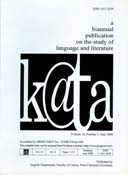Reconciling Aboriginal and White Australians by Negotiating Spatial Boundaries in The Secret River:
A Postmemory Study
Abstract
The dichotomic concept of space between white and Aboriginal Australians has been widely used in the colonial discourse. Through The Secret River, Grenville dismantles the binary oppositions that serves as the main strategy for colonization. We argue that space as a medium of negotiation is used as her strategy to involve in the national reconciliation movement. Postmemory is employed to explain the strategy of choosing spatial locations that links with Grenville’s intergenerational memories. The analysis reveals that the boundaries created by the settlers upon the disputed land cannot successfully cover the chaotic and heterogenous nature of the Aboriginal Dharug land. Instead, the previous characteristics of the land keep appearing as a form of resistance. During the attempt, the settlers slowly recognize the similar nature of the Dharug’s living space to theirs. The process represents the ongoing understanding between the two parties which signifies the spirit of the national reconciliation movement.
Downloads
References
Banner, S. (2005). Why Terra Nullius? Anthropology and Property Law in Early Australia. Law and History Review, 23(1), 95-131. https://doi.org/10.1017/S0738248000000067
Bhandar, B. (2018). Colonial Lives of Property: Law, land, and Racial Regimes of Ownership. Durham, NC, and London: Duke University Press.
Birns, N. (2015). Contemporary Australian Literature. Sydney: Sydney University Press.
Boulanger-Mashberg, A. (2009). Finding the Secret River: Mapping a Composite Narrative of The Secret Riverand Searching for the Secret River. (Master’s thesis, University of Tasmania, Australia). Retrieved from https://eprints.utas.edu.au/10684/2/02whole.pdf
Daele, S.V. (2019). Complicity and Empathy in Kate Grenville’s Trilogy in the Light of the Australian Reconciliation Movement. (Master’s thesis, Ghent University, Belgium). Retrieved from https://libstore.ugent.be/fulltxt/RUG01/002/162/578/RUG01-002162578_2014_0001_AC.pdf
De Bono, A. (2018). Seeing Aboriginal History in Black and White: the Contested History of the Stolen Generation. NEW: Emerging Scholars in Australian Indigenous Studies, 2-3(1), 1-8. http://dx.doi.org/10.5130/nesais.v2i1.1465
Derrida, J. (1997). Of Grammatology. Baltimore: The Johns Hopkins University Press.
Foley, A.M. (2009). Terra Nullius: The Aborigines in Australia. (Thesis, Salve Regina University, The USA). Retrieved from https://digitalcommons.salve.edu/cgi/viewcontent.cgi?article=1033&context=pell_theses
Genger, P. (2018). The British Colonization of Australia: An Exposé of the Models, The British Colonization of Australia: An Exposé of the Models, Impacts and Pertinent Questions Impacts and Pertinent Questions. Peace and Conflict Studies, 25(1), 1-28. 10.46743/1082-7307/2018.1437
Grenville, K. (2007). The Secret River. Edinburgh: Canongate.
Grieves, V. (2008). Aboriginal Spirituality: A Baseline for Indigenous Knowledges Development in Australia. The Canadian Journal of Native Studies, 28(2), 363-398.
Hall, D. (2015). Framed by Reconciliation: Reading Cross-Cultural Space in Early Twenty-First Century Australian Literature. (Doctoral Thesis, Federation University Australia, Australia). Retrieved from https://core.ac.uk/download/pdf/213006097.pdf.
Herrero, D. (2014). Crossing The Secret River: From Victim to Perpetrator, or the Silent/Dark Side of the Australian Settlement. Atlantis Journal of the Spanish Association of Anglo-American Studies, 36(1), 87-105.
Hirsch, M. (2008). The Generation of Postmemory. Poetics Today, 25(1), 103-128. https://doi.org/10.1215/03335372-2007-019
Hirsch, M. (2012). The Generation of Postmemory: Writing and Visual Culture After the Holocaust. New York: Columbia University Press.
Hult, C.A. (1996). Researching and Writing in the Social Sciences. California: Allyn & Bacon.
Koval, R. (2005, July 16). The Secret River. ABC Radio National. Retrieved from https://www.abc.net.au/radionational/programs/archived/booksandwriting/kate-grenville/3629894#transcript
Lang, A. (2014). Going Against the Flow: Kate Grenville’s The Secret River and Colonialism’s Structuring Oppositions. Postcolonial Text, 9(2), 1-16. https://www.postcolonial.org/index.php/pct/article/view/1670
Leigh, J. (2020). Life after the National Apology: Reflections on a Churchill Fellowship to Australia. Qualitative Social Work, 19 (1), 3-11. http://dx.doi.org/10.1177/1473325019895405
Loomba, A. (1998). Colonialism/Postcolonialism. Routledge. London dan New York.
Lowe, K & Yunkaporta, T. (2013). The Inclusion of Aboriginal and Torres Strait Islander Content in the Australian National Curriculum: A Cultural, Cognitive and Socio-Political Evaluation. Curricula Perspectives, 33 (1), 1-14. https://www.acsa.edu.au/pages/images/KLowe_article%20(2).pdf
Mann, T. (2015). The Oxford Guide to Library Research. 4th Edition. New York: Oxford Press.
Metcalfe, L. (2013). The Impact of ‘White Australia’ on the Development of Australia National Identity in the Period between 1880 and 1914. History Initiates, 1(1), 2-9. https://www.mq.edu.au/about_us/faculties_and_departments/faculty_of_arts/mhpir/current_students/history_initiates/history_initiates_journals/vol_i_no_i_march_2013/
Mitchell, K. (2010). Australia’s ‘Other’ History Wars: Trauma and the Work of Cultural Memory in Kate Grenville’s The Secret River. In M. Kohlke, and C. Gutleben (Eds.), Neo-Victorian Tropes of Trauma: The Politics of Bearing After-Witness to Nineteenth-Century Suffering (pp. 253-282). Amsterdam: Rodopi.
Muzondidya. (2013). Race, Ethnicity and the Politics of Positioning: the Making of Coloured Identity in Colonial Zimbabwe, 1890-1980. In M. Adhikari (Ed.), Burdened by Race: Coloured Identities in Southern Africa (pp. 156-184). Cape Town: UCT Press.
O’Dowd, M. (2011). Australia Identity, History and Belonging: The Influence of White Australian Identity on Racism and the Non-Acceptance of the History of Colonisation of Indigenous Australians. Journal of Diversity in Organizations, Communities, and Nations: Annual Review, 10(6), 29-44. https://doi.org/10.18848/1447-9532/CGP/v10i06/38941
Oksman, T. (2020). Postmemory and “The Fragments of a History We Cannot Take Inâ€. Women’s Studies Quarterly, 48(1&2), 133-136. https://doi.org/10.1353/wsq.2020.0027
Petitt, J.E. (2015). Aborigines' dreaming or Britain's terra nullius: Perceptions of land use in colonial Australia. Iowa Historical Review, 5(1), 23-60. DOI:10.17077/2373-1842.1030
Radstone, S. (2013). ‘The Place Where We Live’: Memory, Mirrors, and The Secret River. Memory Studies, 6(3), 286-298. DOI: 10.1177/1750698013485180
Reconciliation Australia. (2021). 2021 State of Reconciliation in Australia Report: Moving from Safe to Brave. https://www.reconciliation.org.au/wp-content/uploads/2021/01/State-of-Reconciliation-in-Australia-report_2021_full.pdf
Schwab, G. (2004). Haunting Legacies: Trauma in Children of Perpetrators. Postcolonial Studies. 7(2), 177-195. https://doi.org/10.1080/1368879042000278861
Staniforth, M. (2013). Depicting the Colonial Home: Representations of the Domestic in Kate Grenville’s The Secret River and Sarah Thornhill. Journal of the Association for the Study of Australian Literature, 13(2), 1-12. https://openjournals.library.sydney.edu.au/index.php/JASAL/article/view/9870
Turina, R. (2019). Autoethnography and Postmemory: A Methodology for the Use of Film Forms as Research. Alphaville: Journal of Film and Screen Media, 17, 64–79. https://doi.org/10.33178/alpha.17.04
Upstone, S. (2009). Spatial Politics in the Postcolonial Novel. Surrey: Ashgate Publishing.
Wood, R. (2018, Feb 13). Can Knowledge Change the World?: An Interview with Kate Grenville. Los Angeles Review of Books Blog. https://blog.lareviewofbooks.org/interviews/can-knowledge-change-world-interview-kate-grenville/

This work is licensed under a Creative Commons Attribution 4.0 International License.
![]() This work is licensed under a Creative Commons Attribution License
This work is licensed under a Creative Commons Attribution License




.png)
.png)

.png)












